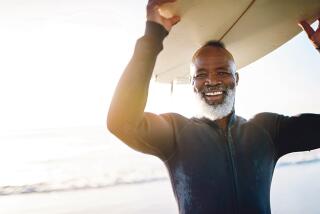Need Help With Leisure Plans? They’ll Work It Out for You
- Share via
The couple came to Dr. Bruce F. Morehouse with a problem:
The husband liked to spend his leisure time in highly competitive pursuits, such as tennis. The wife preferred spending such time in an activity with more social aspects, such as softball.
After each filled out a questionnaire, which was fed into a computer, they were presented with a solution that would allow them to spend more time together.
“I put them into volleyball, which is competitive but still social,” the consultant said. “They are both happy now.”
Another success for Morehouse--the Dear Abby of the Leisure-Lorn.
“A major problem in California is an abundance of leisure riches,” Morehouse said. “What it amounts to is two days and too much. And because we live here, we feel we should be doing something . I’ve often thought that some people here feel guilty on a day off if they aren’t out in the sunshine.”
Celebrity Conscious
But there are so many other ways to spend the time, and so many people seeking the wrong kind of relaxation for it.
“They become celebrity conscious,” Morehouse said. “When Johnny Carson was touting tennis, everybody felt they had to play tennis. Jane Fonda promotes aerobics, and that becomes the thing to do.”
Not necessarily.
In March of this year, after such endeavors as advising the Navy and hospitals, and teaching in Australia, he and a business partner, Mark Jason, decided to found The Leisure Company, which offers personal counseling on how to spend your leisure time.
For a fee of $40, you fill out a questionnaire with 240 possible answers and mail it in. It is run through a computer, and you are provided with a printout. Not only does this narrow down to six possibilities what you might do, but it also deals with your attitudes toward leisure, satisfaction with your current leisure activities, and activity locations in your area.
Activities Inventory
-Section One of the questionnaire is an activities inventory--seeking the client’s possible interests, be they from badminton to horseshoe throwing to yoga.
-Section Two is motivational analysis, asking why you apparently now enjoy what you do--is it to unstructure your time, to keep in shape physically, to use your imagination?
-Section Three measures your leisure activity satisfaction--is it to get away from others, to be stimulated mentally, to have a feeling of achievement?
-Section Four deals with barriers to leisure satisfaction--do you refrain from possible good experiences because you find it difficult to interact with others, because you have too many family obligations, because you feel too much daily stress?
-Section Five deals with your attitudes toward leisure--does time seem to fly when you are thusly involved, do you feel it increases your work productivity, do you feel it contributes to your health?
-Section Six probes aversions--do you dislike activities involving animals, heights, water?
Matches for Client
The answers put The Leisure Company almost in the realm of a dating service, matching the client with six from a data base of 170 activities.
“Nothing is guaranteed, but if only one or two prove to be the solution, we feel we have succeeded,” Morehouse said.
So far, more than 500 Southlanders have made use of the mail service, most of them hearing about it by via word of mouth.
In addition, not to be confused with psychiatric help, personal counseling is offered for $75 an hour.
The Santa Monica office of The Leisure Company has no couch, but in among the golf clubs and weights and chess set and dart board, is a table. Clients desiring a personal touch can bring in their completed questionnaires and have them discussed with Morehouse at the table for the extra charge.
‘Attitude-Changing’
“Sometimes we use the time for attitude-changing,” the counselor explained. “There are people who conclude that work is right, and play is wrong, therefore they are unable to play.
“Sometimes they come back for another session to discuss how things are working out.”
With leisure, different strokes for different folks.
“Take a high-strung executive,” Morehouse said. “He is probably trying to climb the corporate ladder, is competing fiercely throughout his working day.
“His time off, therefore, shouldn’t be spent trying to beat somebody in racquetball. He should take a walk or ride a bike or go swimming. And if he has spare time during his noon hour, he should do something like filling in a crossword puzzle.”
On the other hand, someone in an office who hasn’t been competing at work--like a computer programmer--can compete on his or her days off, and can be more active during a noon break. Stationary rope jumping, and not necessarily with a rope, might be in order for the lunch hour.
Most of the leisure firm’s customers so far, Morehouse and Jason said, have been young singles and pre-retirees, who leave the office pondering a possible new life in spelunking (cave exploring), bird watching, broom hockey, origami (paper folding), rafting, kite flying, disc golf, fencing, folk dancing, you name it.
“Leisure is one area of our lives where we have total control,” the expert said. “This isn’t always the case with our work or family.”
The 47-year-old Morehouse became an authority on user-friendly play after first teaching the Psychology of Leisure and Sport at an institute in Melbourne, then getting a Ph.D. in Leisure Behavior from the University of Illinois, later advising the video game industry on what motivated people to play their games.
Still later, he advised therapeutic recreation mental health specialists at hospitals, which still takes up much of his and his company’s time.
Questionnaires to Sailors
Along the way, however, he put his services to use for the Navy, which let him distribute questionnaires to about 900 sailors aboard three ships stationed in Long Beach.
“Sailors sometimes are at sea for long periods, then find themselves with large blocks of time off,” Morehouse said. “We did leisure profiles, and came up with presumably satisfying ways for them to spend this time, and still stay out of trouble.”
And now his concern is civilians--”if you can make it in leisure, the rest of your life will be better”
Such a pursuit, he said, shouldn’t be so easy as to be boring, nor should it be so difficult as to cause anxiety.
One problem, he explained, may be that someone’s past recreation pursuit may have been such a poor experience that the person is no longer looking for something new, and couch potatoing sets in. Or else, he added, many people aren’t aware of what else is out there, and don’t have the time to search.
When not providing this service, Morehouse himself plays golf twice a week, goes bike riding with his wife, Edye, and makes use of the more than 200 board games he owns.


